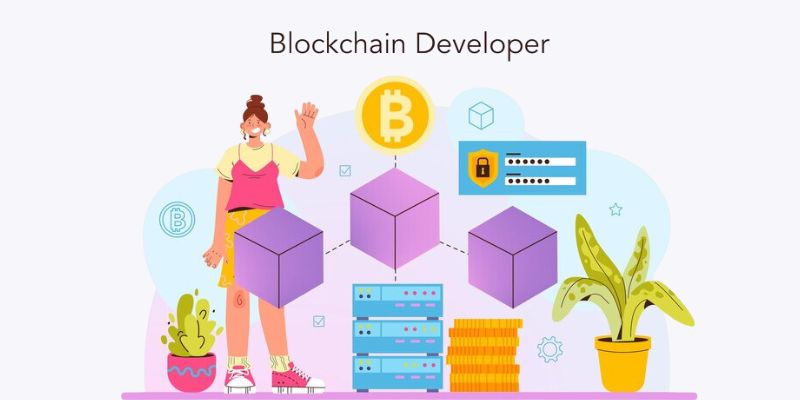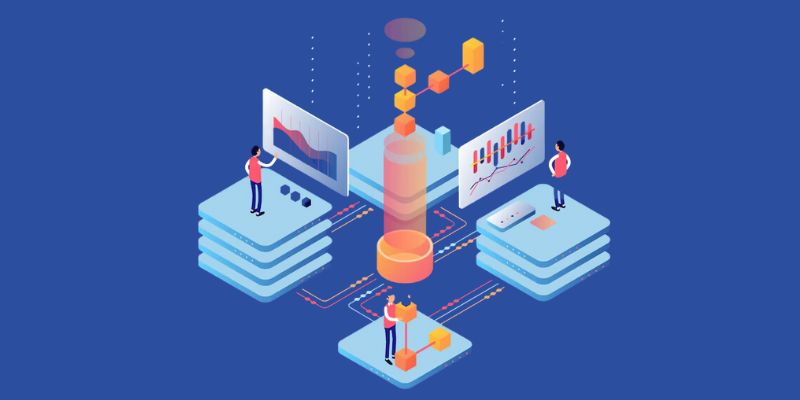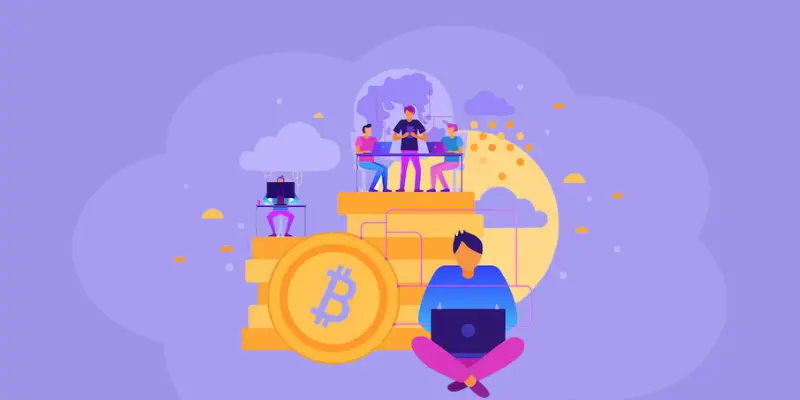In 2024, the technology sector is booming with advances in blockchain technology and cryptocurrency, which is driving the need for skilled developers working in these areas. Despite being interconnected, the tasks of blockchain and cryptocurrency developers are different, each having their own set of skills and experience. This distinction is vital for companies that want to take advantage of these technologies' benefits.
Blockchain developers concentrate on the fundamental technology that drives cryptocurrencies and other decentralized applications. They are responsible to develop and plan in addition to creating and sustaining blockchain-related structures and processes.
Their work involves developing smart contracts based on consensus algorithms and guaranteeing the security and scalability of the blockchain system. With the rise of different blockchain platforms and their applications beyond cryptocurrency, like healthcare, supply chain management finance, and supply chain management, the necessity to hire Blockchain developers was never greater.
In contrast Bitcoin developers are skilled in the design and operation of digital currency. Their expertise is in developing strategies and platforms to facilitate transfers, creation, and administration of assets digitally. This involves working on wallets and exchanges and integrating different financial platforms. Cryptocurrency developers must stay on top of changes in regulations and security concerns specifically related to digital currencies to ensure compliance and protect users' assets.
Also Read: The Developer's Complete Guide to Blockchain Development 2024
Blockchain Developer: Definition and Roles

Blockchain developers are specialists in software engineering who develop, design, and maintain decentralized apps (DApps) and blockchain-based systems. They are focused on using blockchain technology in order to tackle complex challenges, ensure security is preserved, and increase the security of digital transactions. Blockchain Developers are essential in many fields, including health, finance, supply chain, healthcare, and many more, as they continue to change the traditional system.
Blockchain Developers are generally classified into two kinds:
-
Core Blockchain Developers: Core Blockchain Developers are focused on the technology's design and security aspects. They're responsible for defining protocols, governing the Blockchain, and ensuring the system's security.
-
Blockchain Software Developers: Blockchain Software Developers create applications based on blockchain technology. They build decentralized applications (DApps) and smart contracts.
Key Skills and Expertise
To succeed, Blockchain Developers should have a wide range of abilities and deep technical expertise:
-
Programming languages: A proficiency in programming languages like Solidity (for Ethereum), JavaScript, Python, and C++ is crucial. These languages can be utilized to create smart contracts and develop blockchain applications.
-
Knowledge of Blockchain Platforms: Familiarity with important blockchain platforms such as Ethereum, Hyperledger, and Bitcoin is vital. Each platform has unique features and demands a specific level of expertise.
-
Cryptography: An understanding of cryptographic fundamentals is required. This includes understanding hash functions, digital signatures, public and private keys, and encryption/decryption methods.
-
Data Structures: Understanding data structures like Merkle trees, Patricia trees, and Blockchain data structures is essential. These data structures underpin Blockchain's capacity to protect data integrity and security.
-
Smart Contracts: Blockchain Developers must be proficient in testing, developing, and then deploying smart contracts. Smart contracts can be self-executing and directly written in code, allowing for automatic and safe transactions.
-
Consensus Algorithms: It's essential to understand the various mechanisms for consensus, like Proof of Work (PoW) and the Proof of Stake (PoS) and the Delegated Proof of Stake (DPoS). These algorithms are vital to ensuring the security and integrity of blockchain networks.
-
Web development: Knowledge of web development, which includes developing the backend and front end, can be beneficial. This is crucial to developers who work on DApps.
-
Proficient in Problem-Solving: Successful blockchain developers must be able to understand complex issues and develop innovative solutions.
Typical Responsibilities and Tasks
The role of a Blockchain developer includes various duties and responsibilities, which may differ depending on the particular position and sector. But the most common tasks are:
-
The design of Blockchain Protocols: Key Blockchain developers are accountable for designing and developing the protocols for the Blockchain network. They also design consensus algorithms and the network's architecture.
-
Developing Smart Contracts: One of the primary responsibilities of Blockchain Developers is to write, test, implement, and then deploy smart contracts. The contracts can automate transactions and processes, reducing the requirement to use intermediaries.
-
The creation of decentralized Applications (DApps): Blockchain developers create DApps that run on blockchain-based platforms. They are distributed and usually require complicated front-end and backend development.
-
Maintenance and Upgrading Blockchain Systems: Developers are in charge of the continual maintenance and upgrade of blockchain systems to ensure they are secure, reliable, and adaptable.
-
Securing the Blockchain: Blockchain developers must adopt robust security measures to safeguard the blockchain system and their apps from possible security threats and attacks. This requires regular security audits and vulnerability tests.
-
Working with Other Developers: Collaboration is essential when developing blockchain technology. Developers frequently collaborate with researchers, engineers, and other stakeholders to create seamless blockchain technology solutions.
-
Documenting the Development Processes: A well-documented process is vital for the development and maintenance of a blockchain system. Developers must write down their protocols, code, and processes to ensure they are easily read and understood by the other participants.
-
Keep up-to-date with the Latest Industry trends: The world of blockchain technology is developing fast. Developers must stay up-to-date with new trends, technologies, and best practices to ensure they're leveraging modern and efficient techniques.
Read Also: Where to Hire Blockchain Developers: Hiring Tips 2024
Cryptocurrency Developer: Definition and Roles
Cryptocurrency developers are specialist software engineers who design and maintain the infrastructure that supports digital currency. They are vital in creating secure, scalable, and reliable blockchain-based platforms. They are involved in various aspects of cryptocurrency-related projects, ranging from developing new cryptocurrencies and tokens to developing wallets and decentralized apps (dApps) that allow the usage of digital assets.
A cryptocurrency developer's job is vital to ensuring the integrity and function of blockchain networks. They form the foundation of the cryptocurrency industry.
Key Skills and Expertise
Cryptocurrency developers require a wide array of knowledge to understand the intricate world of digital and Blockchain technologies and currency. Here are the most critical capabilities and expertise areas important to cryptocurrency developers:
-
Blockchain knowledge: An in-depth understanding of blockchain technology, such as its structure, consensus mechanisms, and cryptographic concepts, is essential. This knowledge lets developers create reliable and secure blockchain-based platforms.
-
Programming languages: Expertise in common programming languages utilized in blockchain development, such as C++, Java, Python, Solidity (for Ethereum), and Rust. Each of these languages serves a different purpose, from making intelligent contracts to creating the core of Blockchain.
-
Cryptography: Mastering cryptographic protocols and algorithms is vital to guaranteeing the safety of blockchain transactions and data. This includes knowing how hashing functions work, digital signatures, and encryption methods.
-
Smart Contracts: Experience with brilliant contract creation, especially using languages such as Solidity, which Ethereum uses. Smart contracts execute themselves, and the conditions of the agreement are written directly in code.
-
Decentralized applications (dApps): Knowledge of creating dApps in a blockchain network. This requires understanding how to integrate Blockchain with front-end tech and create the smoothest user experience.
-
Skills for Problem-Solving: Strong analytical and problem-solving abilities to tackle the most difficult challenges of Blockchain development, like the issue of scalability, security issues, and consensus issues.
-
Continuous learning: The blockchain and cryptocurrency industry is rapidly changing. It is vital that web developers remain up-to-date with the latest advancements, protocols, and most effective methods of working through continuous education and engagement with the various communities.
Typical Responsibilities and Tasks
Cryptocurrency developers are responsible for a range of responsibilities and tasks according to their particular roles and the projects they're involved in. Below are some of the typical duties and tasks cryptocurrency developers are responsible for:
-
Blockchain Architecture Conceptualization: is the process of designing and developing the structure for blockchain networks. It involves deciding on the proper protocol and developing consensus mechanisms that ensure the network's ability to scale and its security.
-
Innovative Contract Development: writing, testing, and deploying smart contracts on blockchain-based platforms. It includes the creation of automatized agreements for transactions, decentralized applications, and other solutions based on Blockchain.
-
Cryptocurrency Development: This process involves creating new cryptocurrencies and tokens, delineating their criteria, creating an initial supply, and integrating existing blockchain networks.
-
Wallet Development: creating user-friendly and secure wallets to store and manage cryptocurrency. It involves creating interfaces that allow users to connect with blockchains and ensuring that private keys are safe.
-
The development of dApps involves creating decentralized applications that run in blockchain systems. This includes creating user interfaces that include blockchain functionality while ensuring the app's speed and security.
-
Protocol Optimization and Maintenance: Maintaining and optimizing blockchain protocols to increase their security and efficacy means installing modifications, fixing bugs, and improving the blockchain system's effectiveness.
-
Security Audits: Conduct security audits on blockchain platforms, including smart contracts, blockchain systems, and dApps, to discover and limit weaknesses. This is vital for stopping hackers and ensuring the authenticity of transactions on the Blockchain.
-
Collaboration and Engagement with the Community: Collaboration with other developers, users, as well as the larger Blockchain community to exchange information as well as collaborate on projects and help in the advancement of blockchain technology.
Must Read: Where to Find Blockchain Developers? Blockchain Hiring Guide 2024
What is the best way to choose the right career, Blockchain or something else?

Choosing a profession could be overwhelming, particularly in fast-developing fields like blockchain and cryptocurrency development. Both areas offer exciting possibilities and distinct advantages. This comprehensive guide will assist you in assessing your interests and abilities, comprehending the educational and training paths, and evaluating your job opportunities and salary expectations.
Assessing Personal Interests and Skills
-
Personal Interests:
-
Blockchain Development: If you're fascinated by the possibilities of a decentralized system, safe and transparent transactions, and their broader implications for industries like health, finance, and the supply chain, then developing Blockchain may be the ideal option for you. Blockchain technology forms the basis of cryptocurrency, but it can also be used in other ways.
-
Blockchain Development for Cryptocurrencies: If your interests focus on developing digital currencies, financial markets, and new methods of transferring or storing value, an opportunity to build cryptocurrency could be desirable. This area is specifically dedicated to the creation and improvement of the technology of digital currency and related ones.
-
Skill Assessment:
-
Blockchain Development: requires a solid grasp of cryptographic principles, distributed computing, and data structures. The ability to code in languages like Solidity (for Ethereum), Go, or Rust will be helpful.
-
Cryptocurrency Development: This requires an in-depth understanding of blockchain technology focused on creating effective and secure financial technology. Expertise in cryptocurrency and financial algorithms and a familiarity with blockchain protocols such as Bitcoin, Ethereum, and more recent platforms are vital.
Educational and Training Pathways
-
Formal Education:
-
Blockchain Development: Numerous universities offer specific courses on blockchain technology. A software engineering, computer science, or information technology degree provides an excellent foundation. Certain institutions offer master's degree programs that focus on Blockchain.
-
Bitcoin Development: Similar to blockchain development, a solid grounding in computer science and related disciplines is crucial. Other courses or certifications that focus on cryptocurrency technology, such as financial systems and blockchain-related applications, can be beneficial.
-
Online Courses and Certifications:
-
Blockchain Development: Platforms such as Coursera, Udemy, and edX offer comprehensive classes on blockchain development. Accreditation from organizations like The Blockchain Training Alliance or ConsenSys Academy could boost your reputation and knowledge.
-
Bitcoin Development: Online platforms also offer specific courses on cryptocurrency development. Accreditations from organizations such as the CryptoCurrency Certification Consortium (C4) are valuable.
-
Practical Experience:
-
Blockchain development: Participating in hands-on projects and open-source blockchain platforms or hackathons. Experience in the field is essential for comprehending blockchain technology's complexity and practical uses.
-
Cryptocurrency Development: Participation in cryptocurrency-related projects, creating your cryptocurrency, or helping to develop existing ones could offer invaluable hands-on experience.
Job Prospects and Salary Expectations
-
Job Market:
-
Blockchain development: Healthcare providers, financial institutions, supply chain management firms, and even the government are increasingly using blockchain technologies, which is creating numerous possibilities.
-
Blockchain Development for Cryptocurrency: The cryptocurrency market is constantly evolving, with new initiatives and platforms emerging regularly. Fintech startups are booming with opportunities such as crypto exchanges, financial services, and Blockchain-based financial solutions.
-
Salary Expectations:
-
Blockchain Development: Due to their specialization and demand, dedicated blockchain developers earn very high wages. According to recent research, the salary average for Blockchain developers ranges between $150,000 and $100,000 annually, with more experienced developers earning considerably more.
-
Development of Cryptocurrencies: Salaries for cryptocurrency developers can be competitive. A typical salary can range from $90,000 to $140,000 per year, depending on the level of skills and experience. Particularized positions in the top companies or established startups may offer more lucrative compensation.
-
Career Growth:
-
Blockchain development: There is significant potential for professional advancement for those in blockchain development. As blockchain technology continues to develop, experts can progress to roles in senior development, project management, and even positions of leadership in tech firms.
-
Bitcoin Development: The growth of your career in cryptocurrency development depends on the performance of the projects you are working on. The most successful developers can move into higher technical positions, advisor jobs, or entrepreneurial ventures in the crypto space.
Conclusion
Knowing the distinction between a cryptocurrency developer and a blockchain developer by 2024 is essential for companies looking to use blockchain technology efficiently. Blockchain developers are focused on developing and maintaining the foundational design of the blockchain network.
Their skills include developing smart contracts, constructing decentralized apps (dApps), and guaranteeing the security and capacity of blockchain technology. These are crucial for every project that plans to use blockchain technology for a range of purposes, including managing supply chains and digital identification authentication.
In contrast, crypto developers are experts in developing and administering digital currency. Most of their work is focused on cryptocurrency's technical and financial aspects, like creating new currencies, implementing consensus algorithms, and managing crypto wallets. They play an essential role within the continuously evolving financial system, in which security, efficiency, and innovation are the most critical factors.
For businesses that want to hire blockchain developer, it is crucial to understand the needs of their venture. Suppose they are focused on creating a secure and robust blockchain system; an expert in blockchain app development services is vital. If they launch a fresh cryptocurrency or improve an existing one, a blockchain developer's skills will be much more helpful.
FAQs
1. What does a blockchain developer do?
Blockchain developers concentrate on developing decentralized applications (dApps) and platforms that utilize blockchain technology. They are involved in the development of design and intelligent contracts, as well as consensus algorithms and protocols for network security.
2. What are the skills Blockchain developers require?
Blockchain developers generally require expertise in programming languages such as Solidity, C++, or JavaScript, knowledge of cryptography and brilliant contract creation, knowledge of blockchain platforms like Ethereum or Hyperledger, and knowledge of Decentralized Finance (DeFi) notions.
3. What's the job of a Cryptocurrency developer?
Cryptocurrency developers specialize in digital currencies and related technology. They create algorithms, protocols, applications for transactions, mining wallets, and security functions specific to cryptocurrency.
4. What is the most essential skill for being a successful cryptocurrency developer?
Developers of cryptocurrency require knowledge of the basics that are involved in the blockchain industry, such as cryptography, peer-to–peer networks and consensus algorithms such as Proof of Work (PoW) or Proof of Stake (PoS) and also proficiency in programming languages, such as Python, C++ or Go.
5. How do Blockchain developers and cryptocurrency have different goals?
The primary focus of blockchain dedicated developers is more general applications for blockchain technology that go beyond cryptocurrency, such as corporate solutions such as supply chain management and decentralized applications. Cryptocurrency developers, on the other hand, specialize in making and developing digital currency as well as related financial technology.













Share this blog